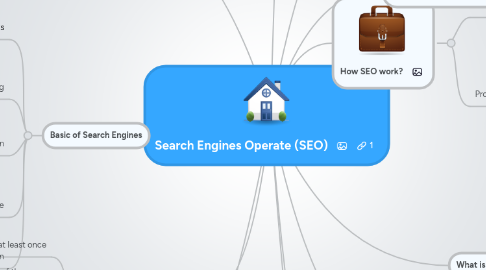
1. Best practices of Keywords
1.1. Use the keyword in the title tag at least once
1.2. prominently near the top of the page.
1.3. At least once in the alt attribute of an image on the page
1.4. At least once in the meta description tag
2. Basic of Search Engines
2.1. Limits
2.1.1. Search engines crawl the web
2.1.2. Search engines Interpret content
2.2. Keyword Usage and targeting
2.2.1. Engines store millions of web pages into smaller databases.
2.2.2. Makes retrieval of data faster
2.3. Keyword Domination
2.3.1. More specific your keywords, the better your chances of ranking based on less competition.
2.4. Keyword Abuse
2.4.1. "stuffing" keywords into text, the url, meta tags and links.
2.4.2. best practice is to use your keywords naturally and strategically
2.5. On-Page Optimization
3. PageRanking Factors
3.1. Keyword selection is KEY!
3.2. Keyword Density
3.3. Inbound links
3.4. Inbound links anchor text
3.5. HTML Page Title
3.6. Age of Domain name
3.7. Site Authority
3.8. Others
3.8.1. Page URL & Meta Tags
3.8.1.1. several ways to use meta robots to control how search engines treat a page
3.8.1.1.1. index/noindex
3.8.1.1.2. follow/nofollow
3.8.1.1.3. noarchive
3.8.1.1.4. nosnippet
3.8.1.1.5. noodp/noydir
3.8.2. Image ALT tags
4. growing-popularity-and-links
4.1. Link signals
4.1.1. Used by search engines
4.1.2. Global popularity
4.1.2.1. need other link partners
4.1.2.1.1. earn trust and authority with the engines
4.1.3. local/topic-specific popularity
4.1.4. anchor text
4.1.4.1. what is anchor text?
4.1.4.1.1. One of the strongest signals the engines use in rankings
4.1.5. TrustRank
4.1.5.1. In order to weed out this irrelevant content, search engines use systems for measuring trust
4.1.6. Link neighborhood
4.1.7. Freshness
4.1.7.1. continue to earn additional links over time are commonly refer to freshness
4.1.7.1.1. What does system use it for?
4.1.8. Social sharing
4.2. Link building basic
4.2.1. "Natural" Editorial Links
4.2.1.1. Links that are given naturally by sites and pages that want to link to your content or company.
4.2.1.1.1. Require no specific action from the SEO,
4.2.2. Manual "outreach" link building
4.2.2.1. SEO creates these links by emailing bloggers for links, submitting sites to directories, or paying for listings of any kind.
4.2.2.1.1. SEO often creates a value proposition by explaining to the link target why creating the link is in their best interest.
4.2.3. Self-created, Non-Editorial
4.2.3.1. Hundreds of thousands of websites offer any visitor the opportunity to create links through guest book signings, forum signatures, blog comments, or user profiles.
5. How SEO work?
5.1. crawling & indexing
5.1.1. 1. Decipher code
5.1.2. 2. Store selected pieces in massive hard drives
5.1.3. 3. Recalled later when needed for a search query
5.2. Providing answers
5.2.1. Return user and relevant result to the searcher's quary
5.2.2. rank those results in order of perceived usefulness.
6. How Do Search Engines Determine Importance?
6.1. Importance interprets "Popularity"
6.1.1. More popular means site/page/document contain more valuable information
7. How people interact with SEO?
7.1. 3 types of search queries users generally perform
7.1.1. Transactional Queries
7.1.2. Informational Queries
7.1.3. Navigation Queries
8. What is SEO?
8.1. art and science of helping websites increase their visibility in major Search Engines
9. Why SEO?
9.1. Achieve top ranking
9.2. Increase web traffic
9.3. Increase revenue
10. Automated programs that made up the Search Engines
10.1. Spiders
10.2. Indexer
10.3. Query Processor
11. What tools use in SEO Keywords Search?
11.1. Google's AdWords Keyword tool
11.1.1. suggests keywords
11.1.2. provides estimated search volume
11.1.3. predicts the cost of running paid campaigns for these terms
11.1.4. How to determine volume for a particular keyword
11.1.4.1. set the Match Type to [Exact]
11.1.4.2. look under Local Monthly Searches
11.1.5. How to know which keywords to target?
11.1.5.1. understand the demand for a given term or phrase
11.1.5.2. understand work required to achieve those rankings
